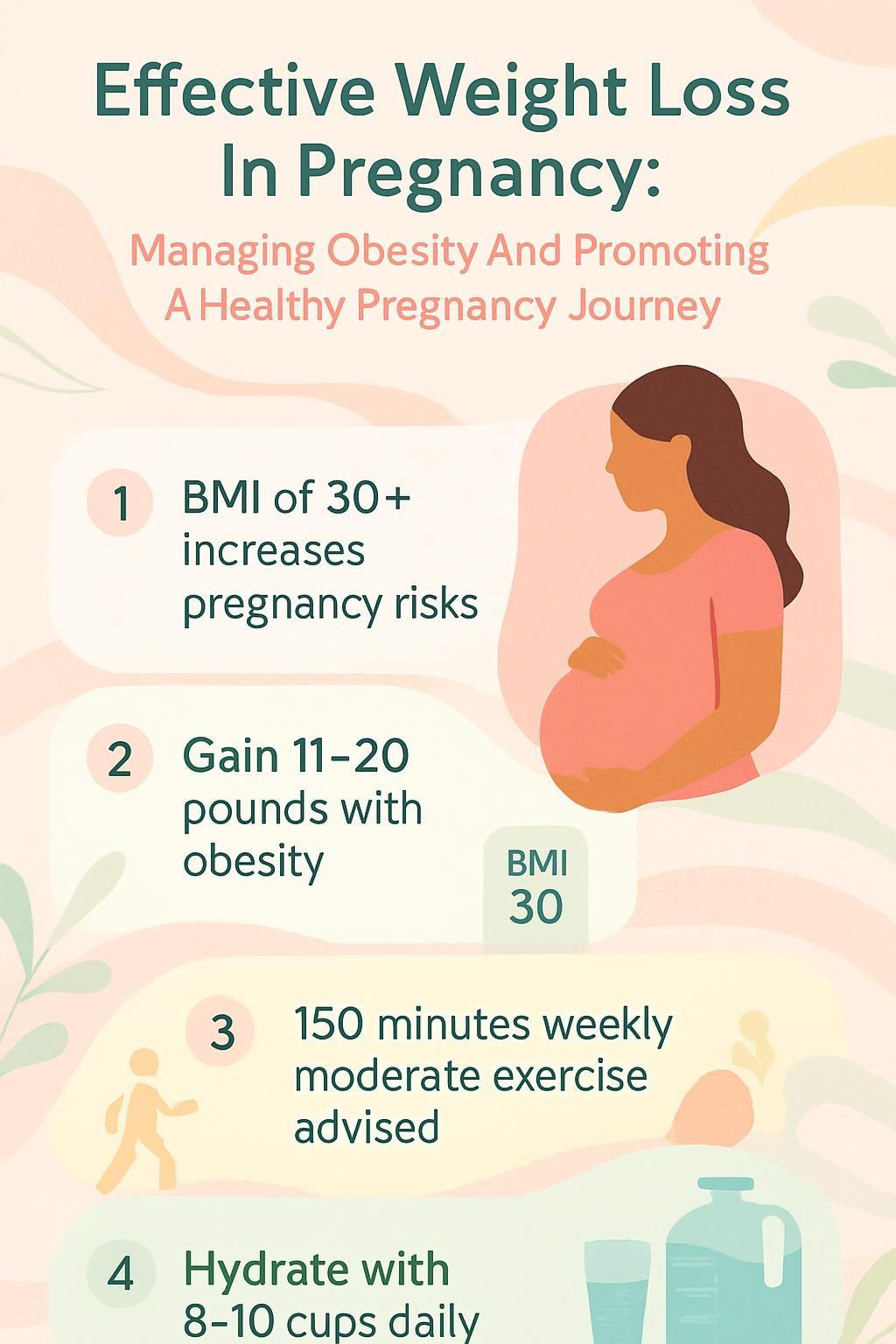Effective Weight Loss In Pregnancy: Managing Obesity And Promoting A Healthy Pregnancy Journey
Our Nutrition Assistant AI Suite will transform your body. You will lose fat, get toned, and build muscle. Gain confidence and optimal health.
Worried about weight loss during pregnancy or starting pregnancy with extra pounds? You are not alone. Obesity, which means a body mass index, or BMI, of 30 or higher, can raise the risk of problems like gestational diabetes and high blood pressure.
This guide explains what drives weight changes, how obesity can affect you and your baby, and what safe steps help you stay on track. You will find clear tips that protect your health and support your growing baby.
Key Takeaways
- Obesity in pregnancy, BMI 30 or higher, is linked to higher risks of gestational diabetes, preeclampsia, early birth, and certain birth defects (CDC; ACOG).
- Most experts advise against trying to lose weight during pregnancy. Focus on healthy weight gain based on your starting BMI.
- If you begin pregnancy with obesity, typical guidance is to gain 11 to 20 pounds. Balanced meals and regular prenatal care are essential.
- Aim for 150 minutes of moderate activity each week, like walking or swimming, unless your clinician advises otherwise. Drink 8 to 10 cups of water daily.
- Call your provider if you lose 5 to 10 percent of body weight, have ongoing vomiting, or cannot keep fluids down.

Understanding Obesity and Pregnancy

Obesity can affect pregnancy outcomes for both mother and baby. Knowing how weight during pregnancy relates to risks helps you make safe, informed choices.
What is obesity during pregnancy?
Obesity means you have a BMI of 30 or higher at the start of pregnancy. The Centers for Disease Control and Prevention, and the American College of Obstetricians and Gynecologists, offer weight gain targets by BMI:
- Underweight, BMI under 18.5: gain 28 to 40 lb
- Normal weight, BMI 18.5 to 24.9: gain 25 to 35 lb
- Overweight, BMI 25 to 29.9: gain 15 to 25 lb
- Obesity, BMI 30 or higher: gain 11 to 20 lb
Your pre-pregnancy BMI guides these goals. Hitting the right range supports your health and your baby’s growth across all trimesters.
How does obesity affect mother and baby?
Obesity raises the chance of miscarriage, gestational diabetes, high blood pressure, preeclampsia, blood clots, and labor interventions. These can include assisted vaginal birth or a cesarean section, which may slow recovery after delivery.
For babies, risks include preterm birth before 37 weeks, stillbirth, and neural tube defects, such as spina bifida. Some newborns may need care in a neonatal unit. During my third trimester with a high BMI, my doctor watched my blood pressure and my baby’s growth closely. That extra monitoring felt reassuring and kept us on plan.
Why Is Managing Weight Important During Pregnancy?
Steady, healthy weight gain lowers the odds of complications and supports normal prenatal development. Think of weight as a tool you can manage with small daily choices.
How does weight management benefit the mother?
Staying within your recommended gain can reduce the risk of gestational diabetes, hypertension, preeclampsia, and sleep apnea. Regular prenatal visits help your team spot issues early. If you start pregnancy with obesity, early testing for gestational diabetes is common and helpful.
Healthy gain may lower the chance of needing a cesarean. My cousin met with her care team after early rapid gain. Simple changes in meals and walking made her labor and recovery smoother.
How does weight management benefit the baby?
Healthy weight management supports your baby’s brain, heart, and organ growth. It also helps reach a healthy birth weight and lowers the risk of defects, including neural tube problems. ACOG notes that healthy gain in pregnancy may reduce the child’s later risk of obesity and type 2 diabetes.
Premature birth can bring breathing and feeding challenges. Balanced nutrition and steady gain reduce these risks and may cut the need for a cesarean.
Can You Lose Weight Safely During Pregnancy?
Approach any weight change with care and medical guidance. The goal is safe gain, not quick weight reduction.
What do experts recommend about weight loss in pregnancy?
Clinicians generally do not recommend trying to lose weight while pregnant, even with overweight or obesity. The aim is healthy gain based on your starting BMI. Intentional dieting can raise the risk of low birth weight, preterm labor, and poor fetal growth.
Healthcare teams support balance, not restriction. You can focus on nutrient-dense foods and regular activity, but avoid cutting calories sharply. Always talk with your obstetrician, family physician, or midwife before changing eating patterns.
What should you consider before trying to lose weight while pregnant?
Avoid active weight loss attempts during pregnancy. A drop of 5 to 10 percent of body weight is a red flag. While obesity increases risks like gestational diabetes and preeclampsia, intentional weight loss can harm fetal growth and raise the chance of early delivery.
Discuss any plan with your provider first. During my first trimester, nausea caused weight swings. My obgyn tracked my numbers and adjusted my nutrition plan so I stayed nourished and hydrated.
What Causes Weight Loss During Pregnancy?
Weight loss has many causes in pregnancy. Understanding the reasons helps you and your clinician make a safe plan.
How do nausea and vomiting affect pregnancy weight?
Morning sickness often lowers appetite and fluid intake, which can lead to weight loss early in pregnancy. Severe nausea and vomiting, called hyperemesis gravidarum, can cause dehydration, dizziness, or dark urine. These signs need medical attention.
If you cannot keep food or liquids down, you may not meet calorie and nutrient needs. This can affect your energy and your baby’s growth. Call your provider if symptoms persist.
Can pregnancy increase energy use and cause weight loss?
Pregnancy raises energy needs. Research suggests calorie burning increases even in early weeks. Combined with hormone shifts, some people lose a few pounds before gaining in the second and third trimester.
During my first trimester, I needed extra small meals just to maintain weight. Your body is building the placenta and supporting rapid growth, which uses energy fast.
What medical conditions cause weight loss in pregnancy?
Hyperthyroidism speeds up body processes and may cause weight loss. Poorly controlled diabetes can also lead to unintended loss if blood sugar runs high. Digestive disorders or infections can reduce nutrient absorption.
Medicines like metformin, used for prediabetes or polycystic ovary syndrome, may change appetite or weight. Severe vomiting from hyperemesis gravidarum often needs medical care. Too much activity without enough food can create a calorie deficit that risks low birth weight. Your prenatal team will watch for these signs and adjust care as needed.
What Are the Risks of Losing Weight During Pregnancy?
Unplanned weight loss can signal a problem that needs prompt attention. Fast action may protect both you and your baby.
How can weight loss lead to nutritional deficiencies?
Cutting intake can reduce key nutrients like iron, calcium, folic acid, and vitamin D. These nutrients support blood health, bone strength, and brain and spine development. Low intake raises the risk of growth restriction and low birth weight.
When my BMI ran high, I aimed to “eat clean” and dropped weight too quickly. My doctor reminded me to read the Nutrition Facts label, choose iron and calcium rich foods, and skip restrictive plans. Slow, steady gain with professional guidance is safer than quick fixes seen online.
What is the risk of low birth weight from weight loss?
Weight loss, even with good intentions, can raise the chance of small for gestational age, or SGA. Studies show the risk climbs across obesity classes. My doctor became concerned when I lost weight in the second trimester and helped me increase calories with nutrient-dense snacks.
SGA babies face higher odds of feeding problems and special care after birth. Close monitoring and early nutrition support can help.
Can weight loss cause premature birth?
Significant weight loss can raise the risk of preterm birth, delivery before 37 weeks. If your body senses stress from poor intake, it can trigger early labor. Babies born early may have breathing issues or need help with feeding.
Regular prenatal checks track your baby’s growth and your health. Ongoing support kept my numbers steady and lowered our risk.
Does weight loss increase cesarean delivery risk?
Links between weight loss and cesarean delivery are mixed. Some data in people with very high BMI suggest managed weight stability may lower C-section rates. In others, weight loss without medical guidance may increase emergency procedures.
Your team will use your BMI, medical history, and current health to guide delivery plans. Share any concerns so they can personalize care.
Strategies to Manage Obesity and Promote a Healthy Pregnancy
Small daily habits make a big difference. Choose actions you can repeat, even on hard days.
How does a balanced diet and portion control help?
A balanced plate supplies the protein, fiber, vitamins, and minerals you and your baby need. Portion control keeps calories in a healthy range and reduces spikes in blood sugar.
- Build meals with lean protein, whole grains, vegetables, fruits, and healthy fats.
- Limit processed foods high in added sugar and saturated fat.
- Consider meeting with a registered dietitian for a simple plan you can follow.
Using smaller plates and tracking portions helped me stay consistent without feeling deprived. These habits support steady gain and avoid nutrient gaps.
Why is hydration important during pregnancy?
Water supports blood volume, digestion, amniotic fluid, and milk production. It also helps move nutrients to your baby and lowers constipation and urinary infection risk.
Aim for 8 to 10 cups of water daily. Pale yellow urine and steady energy are good signs. sip across the day, and adjust based on heat or exercise.
What types of physical activity are safe and effective?
Walking and swimming are safe for most pregnancies and easy to start. Try 150 minutes of moderate activity each week, such as 30 minutes on most days, if your clinician agrees.
Swimming supports movement without joint strain and often feels good later in pregnancy. If nausea limits activity, your provider may suggest timing workouts after small snacks or using anti-nausea options.
How can stress management improve pregnancy health?
Chronic stress can raise blood pressure and blood sugar. Calming practices lower stress hormones and can improve sleep, mood, and appetite.
- Try 10 minutes of breathing or meditation daily.
- Join a gentle prenatal yoga class or take a quiet walk outdoors.
- Set a simple bedtime routine to improve sleep quality.
My prenatal students who practiced short daily meditation often reported better rest and fewer worries.
What Are Healthy Lifestyle Practices During Pregnancy?
Healthy routines add up. Simple choices support weight goals and your baby’s growth.
Which nutrient-rich foods should pregnant women eat?
Fill your plate with color and variety. Aim for fruits, vegetables, whole grains, lean proteins, and dairy or fortified alternatives.
- Protein sources: eggs, poultry, beans, tofu, fish low in mercury.
- Whole grains: oats, brown rice, whole wheat bread.
- Iron rich foods: lean meats, spinach, fortified cereal.
- Calcium sources: milk, yogurt, cheese, calcium set tofu.
Swapping sugary snacks for fruit raised my energy within a week. Balanced meals help control blood sugar and support steady gain.
Why avoid processed and sugary foods in pregnancy?
Heavily processed snacks often pack added sugar and unhealthy fats. These can crowd out nutrient dense foods and drive rapid gain. Diets high in refined sugar raise the risk of gestational diabetes and high blood pressure.
Choosing whole foods stabilizes energy and hunger. It also supports normal ovulation and long term heart health.
How much sleep and rest do pregnant women need?
Target 7 to 9 hours of sleep each night. Short naps can help when nights are tough. Create a calm bedtime routine, dim lights, and put screens away an hour before bed.
Light daytime stretching can ease aches and support better rest. Drink fluids through the day, but slow your intake near bedtime to reduce night bathroom trips.
When Should You Seek Medical Advice During Pregnancy?
Contact your healthcare provider if weight or symptoms change fast. Never start weight loss medications during pregnancy. These drugs are not approved for use while pregnant.
What are signs of excessive weight loss to watch for?
Watch for loss of 5 to 10 percent of body weight, faintness, ongoing weakness, or vomiting that lasts into the second or third trimester. These can signal dehydration or nutrient problems.
When I had sudden loss and felt faint, my doctor checked growth and tweaked my plan. Getting help early made a clear difference.
How is the baby’s growth and development monitored?
At prenatal visits, your team measures your belly, listens to the heartbeat, and orders labs when needed. Ultrasounds assess growth, fluid, and placenta health.
Going to every appointment helps your provider catch issues early and adjust care to keep you and your baby safe.
What Are Common Myths About Pregnancy and Weight Loss?
Misleading advice spreads quickly. Sorting fact from myth protects you and your baby.
What pregnancy weight loss myths need debunking?
Myth: losing weight during pregnancy always lowers risk. Fact: intentional loss can raise the chance of low birth weight and growth problems. Experts recommend healthy gain instead of dieting.
Myth: people with obesity should try to shed pounds while pregnant. Fact: current evidence supports balanced eating and activity rather than weight loss attempts.
What weight loss methods are safe and effective in pregnancy?
Skip drastic diets, fasting, and appetite suppressants. Safer strategies focus on preventing excess gain.
- Eat small, frequent, nutrient-rich meals to steady blood sugar.
- Use portion control instead of strict calorie cutting.
- Aim for 150 minutes of moderate exercise weekly, if cleared by your provider.
During my pregnancy with obesity, drinking more water reduced cravings and helped me meet hydration goals. Always coordinate plans with your care team.
What Nutritional Tips Do Experts Recommend?
Simple meal planning, smart snacks, and key nutrients can keep you on target. A little preparation goes a long way on busy days.
How to plan meals for a healthy pregnancy?
Plan three meals and two to three snacks. Most people need about 300 extra calories in the second and third trimesters, which is a yogurt and fruit or a handful of nuts with cheese. Choose whole grains for energy and lean proteins for growth. Add leafy greens for iron and folate, and include dairy for calcium.
If morning sickness hits, try crackers before getting out of bed. Sip fluids often. A simple food journal can help your clinician spot gaps and suggest easy fixes.
Sample Meal Plan Table:
| Meal | Food Example | Key Nutrient |
|---|---|---|
| Breakfast | Oatmeal with berries and milk | Fiber, calcium |
| Snack | Whole wheat crackers | Steady energy |
| Lunch | Grilled chicken salad | Protein, iron |
| Snack | Yogurt with almonds | Probiotics, calcium |
| Dinner | Baked salmon with broccoli | Omega-3, folate |
Eat every three to four hours. Smaller, steady meals can ease nausea and help you meet nutrition goals.
Which nutrients are essential for mother and baby?
Take a prenatal vitamin unless your clinician advises another plan. Key nutrients include:
- Folic acid for brain and spine development.
- Iron to prevent anemia and support oxygen delivery.
- Calcium and vitamin D for bones and teeth.
- Protein to build tissues and muscles.
- Omega-3 fats for healthy brain and eye development.
Eat a range of fruits and vegetables for vitamins, antioxidants, and fiber. Healthy fats from avocado and nuts add energy and support growth.
How Do Healthcare Providers Support Pregnancy Weight Management?
Your care team is your partner. They help you set realistic goals and adjust as pregnancy progresses.
Why are prenatal checkups important for weight management?
At each visit, your team tracks weight and blood pressure, screens for gestational diabetes, and reviews symptoms. These checks catch problems early, which can prevent complications. You also get coaching on meals, activity, and sleep.
How to develop a personalized pregnancy weight plan?
Start with your provider. Share your BMI, health history, habits, and concerns. People with a BMI above 40 sometimes need very little gain. Your plan will be personalized to your needs.
A registered dietitian can create easy meal plans and help you keep a food diary. Low impact activities like walking or prenatal yoga work for many. Setting small weekly goals kept me motivated and on track.
Frequently Asked Questions
Quick answers to common concerns can reduce stress and guide next steps.
Can overweight pregnant women lose weight safely?
Experts advise focusing on weight stability or lower range gain, not weight loss. A large Kaiser Permanente study of more than 29,000 pregnancies found that actual weight loss raised the risk of babies born small for gestational age in all obesity classes.
Always check with your provider before changing your plan. Nutritious meals and regular activity are the safest path.
Is it safe to exercise while pregnant?
Most people can exercise safely during pregnancy. ACOG recommends 150 minutes of moderate activity each week, such as brisk walking, swimming, or prenatal yoga.
Consult your provider first, especially if you have complications. Avoid activities with a risk of falling or abdominal impact. Staying active can improve mood, sleep, and weight control.
Conclusion
Managing pregnancy weight protects your health and supports your baby’s development. Focus on balanced meals, steady hydration, and safe activity like walking or swimming. Work with your healthcare team to set goals based on your starting BMI and to adjust as needed.
This information is educational and not a substitute for medical advice. For questions about pregnancy weight loss or gain, talk with your clinician. With the right support, you can make choices that give you and your baby a healthy start.
FAQs
1. Is weight loss safe during pregnancy for women with obesity?
Doctors do not recommend active weight loss during pregnancy. Instead, they advise managing weight gain within healthy limits. Research shows that women with obesity should aim for a lower weight gain range, as outlined by the Institute of Medicine. This approach helps reduce risks for both mother and baby.
2. What strategies help manage obesity during pregnancy?
A balanced eating plan, regular physical activity approved by a healthcare provider, and close monitoring of weight gain are key strategies. Studies suggest that nutrition counseling and support from medical professionals improve outcomes for pregnant women with obesity.
3. How does managing weight affect the health of the baby?
Proper management of maternal weight lowers the risk of complications such as gestational diabetes, high blood pressure, and large birthweight infants. Data from clinical studies indicate that babies born to mothers who maintain healthy habits have better short- and long-term health outcomes.
4. Can personal experience guide effective weight management in pregnancy?
Many women find success through structured programs led by dietitians or prenatal care teams. For example, one patient shared how weekly check-ins with her nurse helped her stay on track with meal planning and gentle exercise routines. These real-life stories highlight the value of ongoing support throughout pregnancy.
Summary: Managing obesity during pregnancy involves careful attention to nutrition, physical activity, and professional guidance. Evidence supports tailored approaches that promote healthy outcomes for both mother and child while avoiding unnecessary risks linked to rapid or excessive weight loss.







